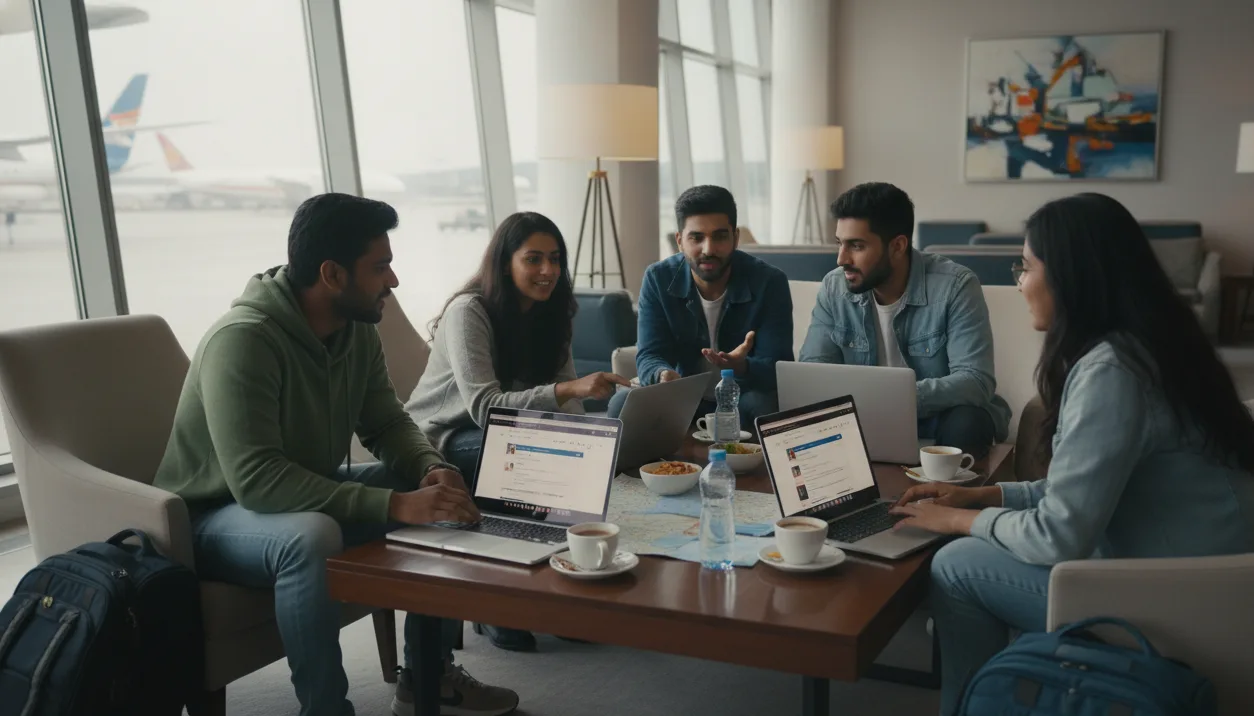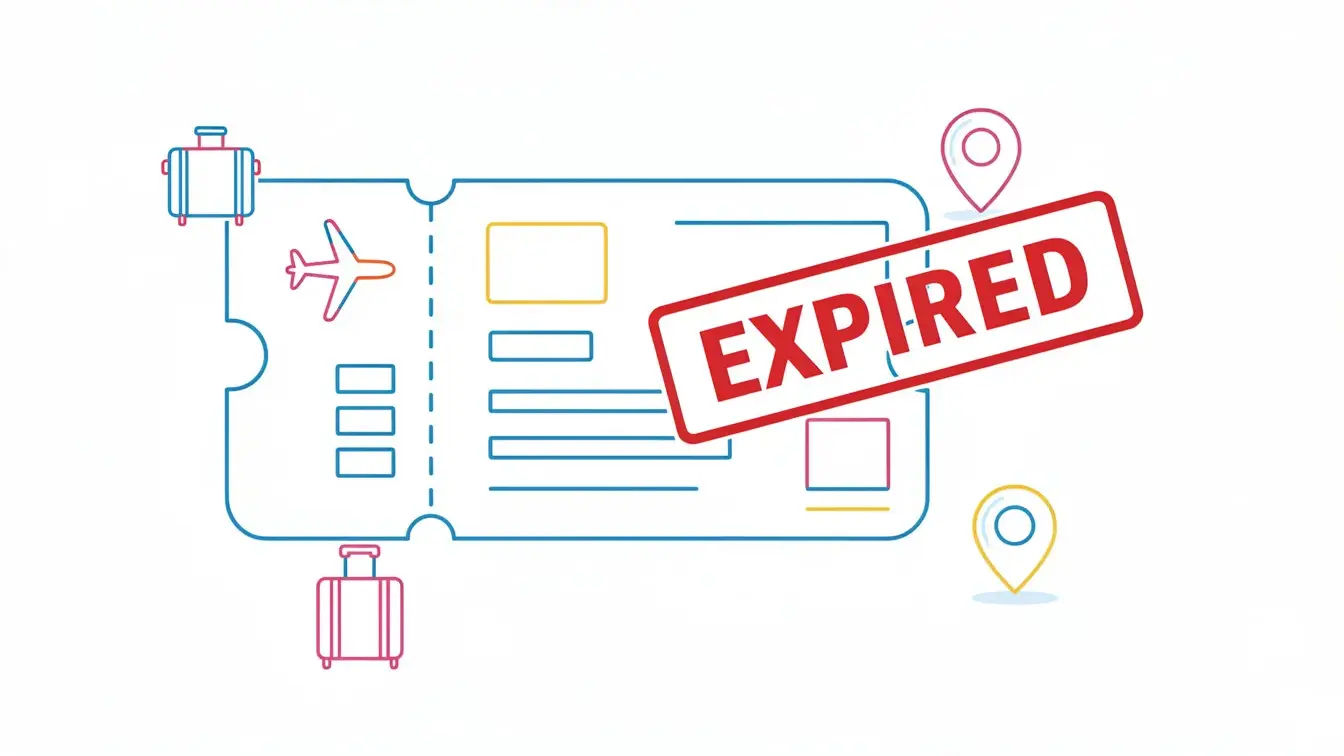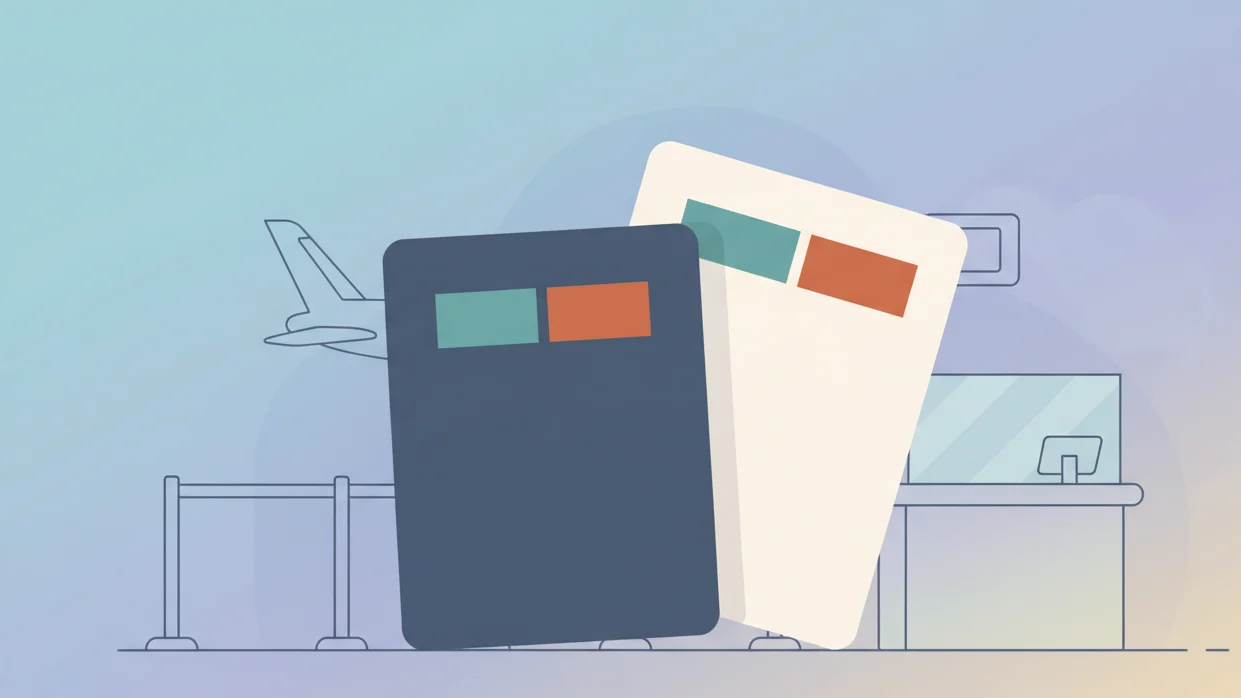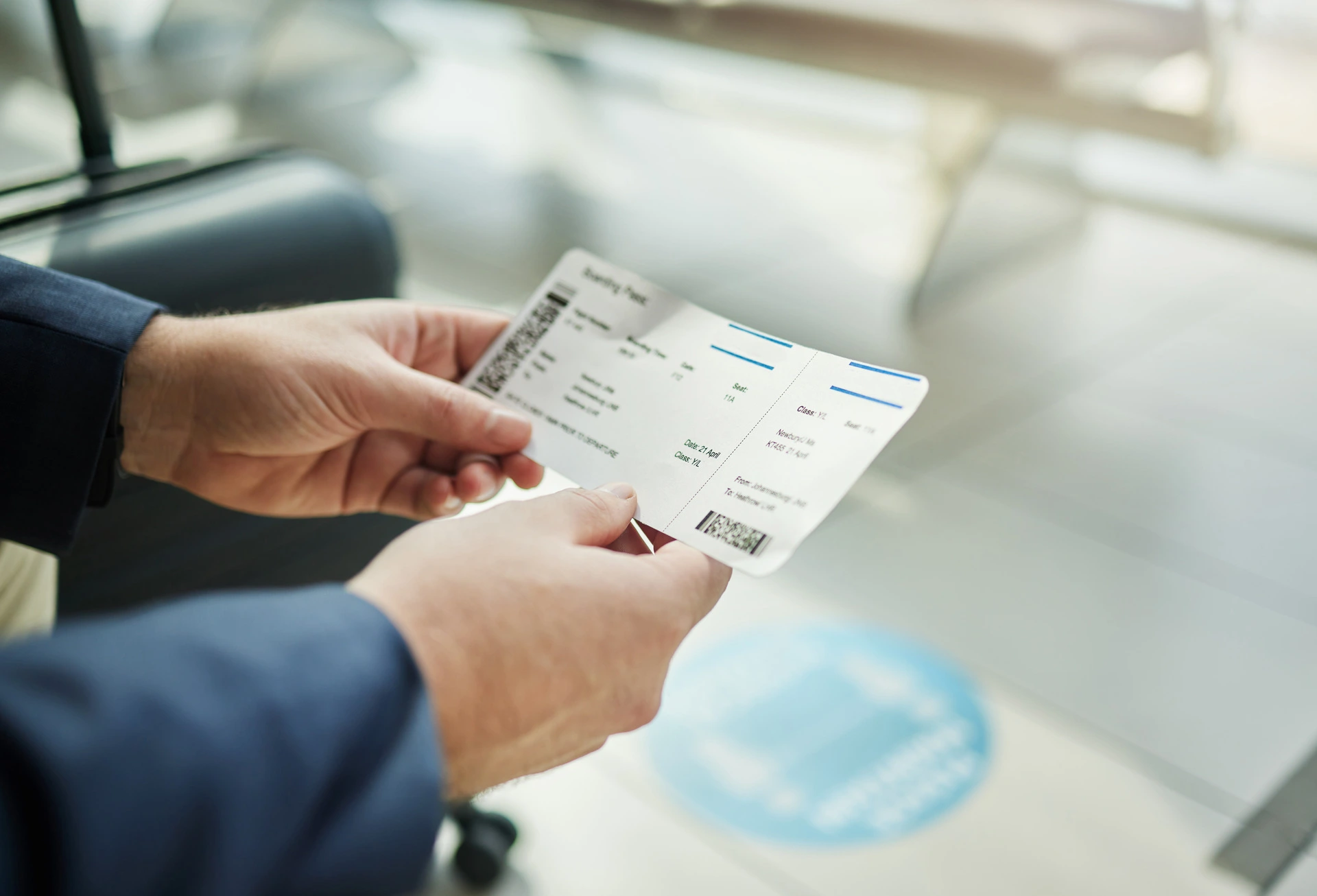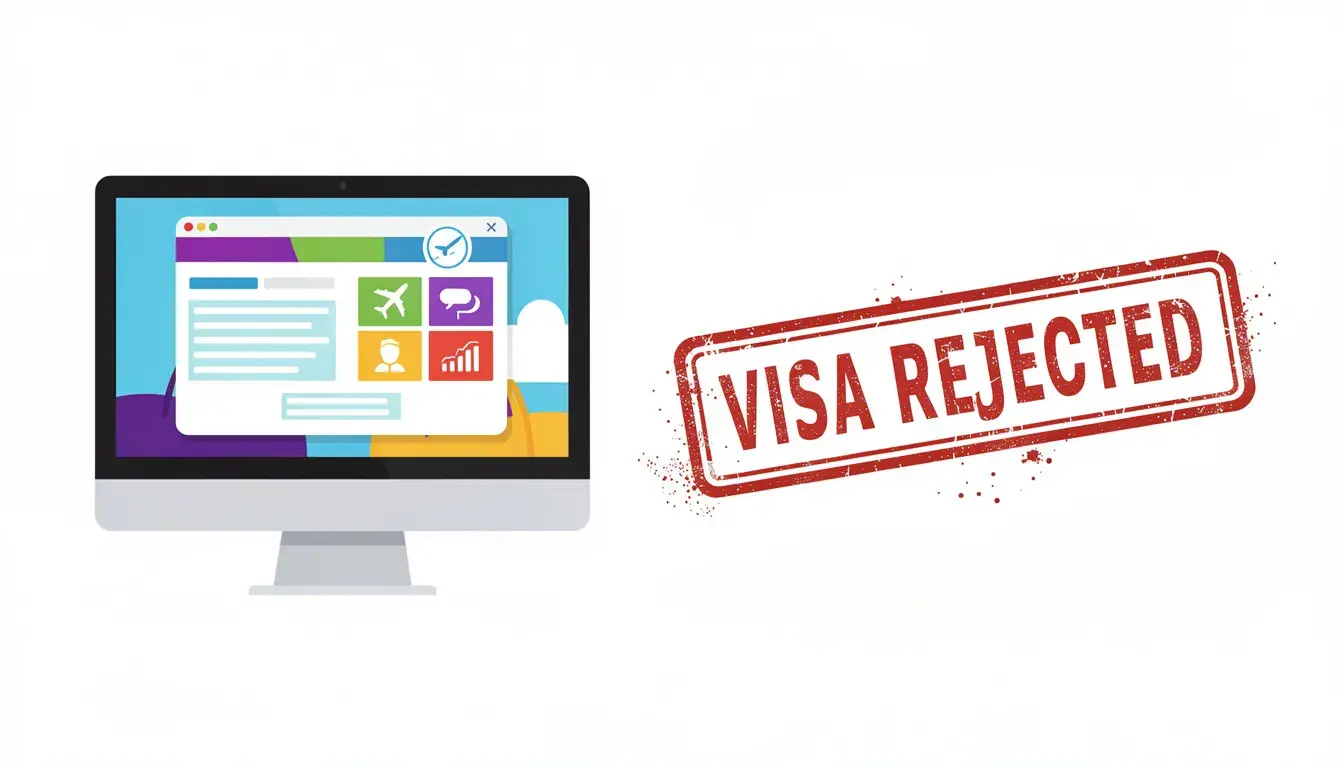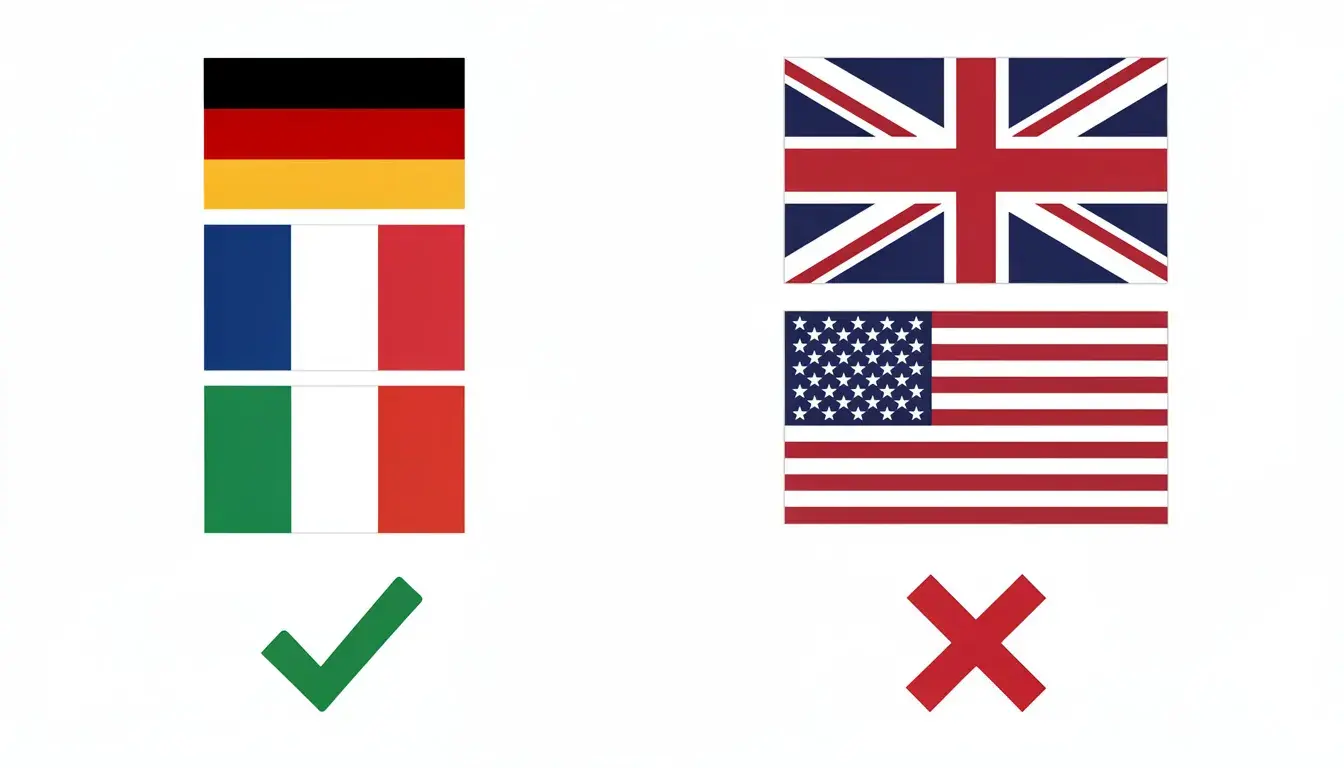Dummy Ticket India Review 2025 — What Real Travelers Say
If you’ve ever applied for a visa from India, you’ve probably heard the term dummy ticket. Some travelers swear by it, others think it’s risky, and many still confuse it with a fake ticket. But in 2025, real travelers across India are finally setting the record straight. A dummy ticket isn’t a scam—it’s a smart, verified reservation that helps you prove your travel plans without paying for a full fare upfront. For more guidance, explore our FAQ on visa essentials or dive into blogs for expert tips.
Whether you’re a student applying for your first visa, a family planning a European trip, or a digital nomad juggling multiple destinations, knowing how dummy tickets really work can save time, stress, and money. In this review, we’ll see what Indian travelers are saying, what’s changing, and how to stay safe while doing it right. Learn about our team's story in the About Us section. Start your visa process the smart way—book a dummy ticket now and get instant, verifiable flight reservations.
Real travelers across India have shared overwhelmingly positive feedback about using dummyflights.com for visa-ready dummy tickets. Each reservation includes a verifiable PNR that can be checked on the airline’s website—helping applicants secure Schengen, UK, and Dubai visas without risking money on refundable tickets. These 2025 reviews highlight instant delivery, embassy acceptance, and 24/7 support as the key reasons Indian travelers trust dummyflights.com for stress-free visa documentation.
Last updated: October 2025 — verified traveler reviews analyzed by dummyflights.com.
Table of Contents
Understanding Dummy Tickets In The Indian Travel Context

In 2025, the phrase “dummy ticket” still divides opinion among Indian travelers. For years, people thought it meant something shady—an illegal, fake document meant to fool embassies. But as more Indians travel, study, and work abroad, that mindset is changing. You now hear travelers on Reddit, YouTube, and Facebook say things like, “I used one for my Schengen visa and it worked fine,” or “It’s not fake if you can verify it on the airline website.”
Today, the conversation is less about whether dummy tickets are real and more about how to use them smartly. The old suspicion is giving way to cautious acceptance. People are realizing it’s not about tricking anyone—it’s about showing intent without wasting money on a full fare before you even know if your visa is approved. Save time and money before your visa is approved—try a quick and secure dummy ticket booking today.
The Changing Public Perception
If you scroll through Indian travel groups or listen to airport conversations, you’ll hear a mix of opinions. Many older travelers still say, “I’d rather book a full ticket and cancel later.” Younger applicants—especially students and frequent flyers—see dummy tickets as a practical shortcut. It’s not that they’re trying to save every rupee; they just understand the system better.
A few years ago, dummy tickets were whispered about like a secret. People thought using one might get them rejected or blacklisted. But things have shifted. Travel influencers and experienced visa applicants have shared their real stories online, and that’s changed the mood. Now, when you type “dummy ticket India” on YouTube, you find creators breaking it down clearly: what it is, how to verify it, and what to avoid.
Reddit threads like r/IndiaTravel and r/StudyAbroadIndia are full of balanced takes. Some users explain that embassy websites mention “flight reservations” — not “paid tickets.” Others share how they verified their PNRs through airline sites before submission. The internet has become the modern travel classroom, replacing the old neighborhood agent who once handled everything.
If you could chart it, India’s 2025 dummy ticket sentiment looks like this:
-
Around 40% of travelers still call it “fake” because they’ve never seen a real verifiable PNR.
-
About 50% understand it’s a temporary reservation, not fraud.
-
Roughly 10% now use dummy tickets confidently with their visa files, especially for Schengen and UK applications.
That last group—students, freelancers, and digital nomads—is growing fast. They’ve realized that embassies don’t reject you for using a dummy ticket; they only expect it to make sense.
Conversations From Across India
Let’s be real—attitudes in India differ by city. Travelers in metro areas are usually better informed. In Delhi or Mumbai, you’ll meet people who’ve done multiple visa applications. They talk about dummy tickets as casually as travel insurance. For them, it’s just another document.
A Bengaluru tech worker, for example, shared how he submitted a dummy ticket for his Schengen visa. The officer glanced at the itinerary, stamped his file, and moved on. “They don’t care if it’s paid,” he said. “They just want to know you’ll come back.” He verified his reservation online, printed the airline confirmation, and submitted it without issues.
But go to a smaller city—say, Lucknow or Indore—and the story changes. A student there told a different tale. She bought a “dummy ticket” from a Telegram contact who charged ₹400 and sent a PDF within minutes. It looked fine, but when the VFS officer tried to check the PNR, it didn’t exist. The file was flagged, and she had to reschedule her application with proper documents.
This contrast says a lot about the Indian travel landscape. Access to reliable information still depends on where you live. Tier-1 city applicants learn from peers and online forums; Tier-2 and Tier-3 applicants often depend on agents who may or may not know the rules. That’s why awareness is spreading unevenly—some Indians use dummy tickets responsibly, while others still fall for shortcuts.
Across Facebook groups like “Indians Applying for Schengen Visas” or “Study Abroad 2025,” you’ll find heated debates. One commenter says, “Dummy tickets are fake and risky.” Another replies, “Only if you buy from fake sellers. I got my Germany visa with one.” It’s a conversation repeating in every Indian city, from Pune to Hyderabad.
What unites everyone is fear—fear of rejection, of wasting money, of being scammed. But experience is slowly replacing fear with confidence. As more travelers share their positive results, the stigma around dummy tickets is fading.
The Broader 2025 Trend
There’s a bigger story behind all this. Indian travelers are changing the way they prepare for visas. The old model—paying an agent thousands to “handle everything”—is fading fast. We’re now in the era of do-it-yourself visas. People book appointments, gather documents, and print cover letters themselves. In that process, dummy tickets have become part of the normal checklist.
Applicants now think practically: “Why should I buy a ₹70,000 flight before I even know if I’ll get the visa?” A verifiable dummy ticket bridges that gap. It shows embassies that you have intent without financial risk.
Even travel consultants, once skeptical, have adapted. Many now offer genuine flight reservations through airline systems. Some even bundle them with hotel bookings and insurance as “visa-ready packs.” They understand that clients want safety and verification, not random PDFs.
Still, confusion lingers. On WhatsApp groups and Facebook pages, misinformation spreads faster than facts. A random post claiming “Embassy rejected me because of a dummy ticket” can spark panic, even if the rejection had nothing to do with the ticket. People forget that embassies look for consistency, not cash receipts. If your dummy ticket matches your itinerary and hotel dates, it’s valid proof of intention.
You’ll also notice how Indian travelers have grown more detail-oriented. Ten years ago, most applicants didn’t know how to check a PNR. Now, they open airline websites, enter their code, and take screenshots for peace of mind. That’s progress.
The shift isn’t just about technology; it’s about attitude. Indians used to see visa paperwork as intimidating. Now, they see it as a process they can control. Dummy tickets, when used correctly, are part of that empowerment. They help travelers plan smarter, not harder.
There’s also a generational aspect. Younger travelers—especially those born after 2000—view dummy tickets like digital boarding passes: tools, not risks. They’re used to booking buses and trains online, checking confirmation emails, and managing refunds. So, verifying a flight reservation doesn’t scare them. Older travelers, who grew up depending on agents, still hesitate. But the gap is narrowing.
In short, India’s relationship with dummy tickets in 2025 reflects its broader travel maturity. We’re flying more, researching more, and trusting ourselves more. The dummy ticket isn’t taboo anymore—it’s part of modern travel planning.
Where The Confusion Still Lingers
Even with growing acceptance, misinformation hasn’t vanished. Some agents still sell “editable PDFs” claiming to be dummy tickets. Many travelers, especially those applying for the first time, don’t realize that a verifiable PNR is what makes it legitimate. When they submit an unverifiable file, they risk trouble not because dummy tickets are wrong, but because theirs isn’t genuine.
It’s a distinction many Indians are still learning: the problem isn’t the concept, it’s the execution.
Travelers are also learning that embassies don’t reject applications just for using dummy tickets. They only flag fake or inconsistent documents. Once you understand that difference, the anxiety disappears.
For first-time applicants, that realization is freeing. You can plan confidently, knowing that a real dummy ticket—one you can check on the airline website—doesn’t break any rules. It simply protects you from buying expensive tickets too soon.
The Takeaway For 2025
So, how do Indians see dummy tickets now? In one word: practical. We’ve come a long way from calling them “fake.” Most travelers now understand their purpose. The conversation has matured from fear to function.
Across India, from students applying for their first Schengen visa to families planning summer trips to Europe, the message is the same: dummy tickets work if they’re verifiable.
Travel influencers demystified them. Social platforms spread awareness. And real traveler stories replaced rumors with results.
Still, the confusion hasn’t completely gone. For every success story, there’s a cautionary tale of someone scammed by a fake provider. But the tide has turned. In 2025, dummy tickets are no longer a taboo topic in India’s travel circles—they’re just another smart tool for travelers who do their homework.
What Real Travelers Are Saying — Experiences, Wins, And Frustrations

If you want to understand how dummy tickets really work in India, the best place to start is with real traveler stories. Forget the marketing talk or the scary WhatsApp warnings—what people actually experience tells you more than anything else.
In 2025, Indians are talking openly about how dummy tickets have helped, confused, and sometimes even burned them. The result is a mix of wins, frustrations, and cautionary tales that perfectly capture India’s evolving travel culture. Need proof of travel for your visa? Simply book a dummy ticket online and download your verified itinerary within minutes.
The Positive Stories
Let’s start with the good news—the thousands of Indian travelers who’ve used genuine dummy tickets successfully. These are people who followed the rules, used verifiable reservations, and got exactly what they needed: peace of mind and a visa approval.
Take the case of a couple from Mumbai planning a trip to France and Italy. They applied for a Schengen visa through VFS and didn’t want to buy a ₹90,000 flight before knowing if they’d be approved. They ordered a dummy ticket online from a legitimate provider that issued a verifiable PNR. The husband checked it himself on the airline’s “Manage Booking” page. “When we went for our appointment,” he said, “the officer just glanced at it, smiled, and said ‘okay.’ That was it. No issues at all.”
You’ll hear similar stories from students. A Chennai student heading to Canada explained how a dummy ticket helped her align her visa dates with her university’s I-20 form. “The admission process took longer than expected,” she said. “If I’d booked a full flight, I would have lost ₹70,000. The dummy ticket gave me flexibility.” She verified it online, printed it with the airline logo, and submitted it confidently.
Business travelers tell another side of the story. A Bengaluru software consultant who attends multiple conferences each year says dummy tickets have become part of his standard visa checklist. “I don’t even think twice now,” he said. “It’s like travel insurance—you just get one, verify it, and attach it. The embassy only checks that your plans make sense.”
Then there are frequent flyers and digital nomads who use dummy tickets as proof of onward travel in countries like Thailand, Indonesia, or Malaysia. Airlines often ask for onward travel before boarding from India, especially when the return flight isn’t confirmed. A solo traveler from Hyderabad shared how a verifiable dummy ticket saved her at the Bangkok check-in counter. “The AirAsia staff asked for proof of onward travel,” she said. “I showed my reservation with a real PNR on my phone. They scanned it, nodded, and let me through.”
These travelers aren’t cutting corners—they’re being smart. They know dummy tickets are legal, provided they’re real reservations. For them, it’s a time-saving, money-saving, stress-reducing tool. And as more Indians see these success stories online, confidence grows.
The Mixed Experiences
Not every experience goes perfectly. Even genuine dummy tickets can run into problems if travelers don’t understand how they work. One common issue Indian applicants face is expired PNRs.
A student from Pune shared how his flight reservation expired before his visa file was processed. “My PNR worked fine at first,” he said, “but by the time the embassy reviewed it, the reservation had been auto-canceled.” It didn’t cause a rejection, but it did cause stress. He had to rebook and submit a new one mid-process. Situations like this aren’t rare—most reservations only stay active for 3–7 days.
Another frequent complaint involves confusion during resubmissions at VFS or BLS centers. Some Indian applicants are told to update travel dates when appointments are delayed, and that means their old dummy tickets no longer match their hotel bookings or travel insurance. Many first-timers don’t realize they need to refresh the reservation if the visa timeline shifts.
Then there’s the problem of agents overcharging. Some local agents in Delhi or Ahmedabad charge ₹2000–₹2,500 for what should cost ₹1000–₹1500. They frame it as a “guaranteed embassy-accepted document,” but often they’re just booking a temporary hold through a free airline portal and printing it. Travelers end up paying premium prices for something they could’ve done themselves—or worse, something unverifiable.
A particularly frustrating scenario involves non-verifiable PDFs. A young applicant from Kochi said she panicked when her document didn’t open on the airline’s website. “I entered the code, but it said ‘PNR not found.’ I thought my visa would be rejected,” she explained. Turns out the seller had shared a canceled record. She had to scramble for a replacement right before her appointment.
These are not horror stories—just examples of what happens when travelers don’t fully understand what they’re buying. Dummy tickets work best when you treat them like real bookings: verify them, match your travel dates, and update them if needed.
The Negative Encounters
Unfortunately, not everyone in India gets lucky. For every smooth success, there’s someone who’s been scammed.
You’ll find posts like this all over Reddit and Quora:
“Agent took ₹500 on WhatsApp, sent me a ticket in 10 minutes. Looked real, but when I checked the PNR, it didn’t exist.”
These scams have a pattern. They start with Telegram or Instagram ads promising “dummy tickets in 5 minutes.” The seller insists on UPI payment first. Within minutes, you receive a clean-looking PDF that says “CONFIRMED” with a made-up booking code. It might even show a fake airline logo. When you try to verify it, there’s nothing there. The PNR doesn’t exist, and the seller has already blocked your number.
The emotional cost is worse than the financial loss. Applicants often panic, wondering if they’ve unknowingly submitted a fake document. One traveler from Jaipur said, “I didn’t sleep the whole night before my appointment. I kept imagining the officer calling me out for fraud.”
These scams thrive because people still don’t know the difference between a dummy ticket and a fake one. A dummy ticket is a real reservation—a fake ticket is just a PDF someone made in Photoshop. Many first-timers don’t realize that distinction until it’s too late.
Social media doesn’t help much. Whenever someone posts about dummy tickets, half the comments scream “illegal!” and the other half defend them. On Indian Facebook travel groups, debates get heated. One person might post, “Got my Schengen visa using a dummy ticket, no problem.” The next comment says, “You’re promoting fraud.” It’s confusing for newcomers trying to figure out what’s right.
Even Indians living abroad argue about it. In expat groups, you’ll find posts from NRIs telling students not to risk it, while others reply with screenshots of verified bookings as proof. The conversation is loud, emotional, and often misinformed.
This is where education makes the difference. The people who’ve been scammed usually skipped one key step—verification. They never checked the PNR before submission. If you can see your name and flight on the airline website, you’re safe. If you can’t, it’s a red flag.
India-Specific Themes Emerging
Looking across all these stories—good, bad, and in-between—a few clear themes stand out about how Indians use dummy tickets today.
1. Urban travelers are more informed. In metro cities, travelers are plugged into Reddit threads, YouTube tutorials, and Facebook visa communities. They know where to find genuine providers. They double-check every document. For them, dummy tickets are routine, not risky.
2. Smaller-city applicants are still vulnerable. In Tier-2 and Tier-3 cities, applicants often rely on local agents who may not understand what “verifiable” means. That’s where most scams happen. Many of these travelers don’t even know you can check a PNR yourself. They just assume the agent’s word is enough.
3. Students rely on peers, not professionals. University WhatsApp groups and Telegram chats have replaced agents for many students. They share links to trusted dummy ticket providers, sample documents, and visa checklists. This peer network helps—but it also spreads rumors quickly.
4. Professionals value convenience. Corporate travelers and freelancers prefer services that are quick, transparent, and GST-compliant. They don’t mind paying a few hundred rupees more if it means verified PNRs and prompt customer support. For them, time is worth more than a small saving.
5. Awareness is rising, but education is uneven. In 2025, more Indians than ever know what a dummy ticket is, yet not everyone knows how to verify one. Some see it as a normal step; others still think it’s risky. That gap is closing slowly, but it’s still there.
When you listen to real Indian travelers, a pattern emerges. Those who educate themselves rarely face problems. Those who rush or rely on shady agents usually do.
Dummy tickets have helped countless Indians travel smarter—saving money, reducing stress, and protecting them from unnecessary losses. But like any travel tool, they work only if used correctly.
By 2025, the conversation has matured. Indians now talk about dummy tickets not as a trick, but as a technique. And while confusion still pops up in smaller circles, most travelers agree on one thing: a verified dummy ticket isn’t just safe—it’s smart.
It’s a sign of how far Indian travelers have come. We’re not just passengers anymore. We’re planners, decision-makers, and informed applicants who understand the system—and dummy tickets have quietly become part of that journey.
Why Dummy Tickets Spark So Much Debate In India
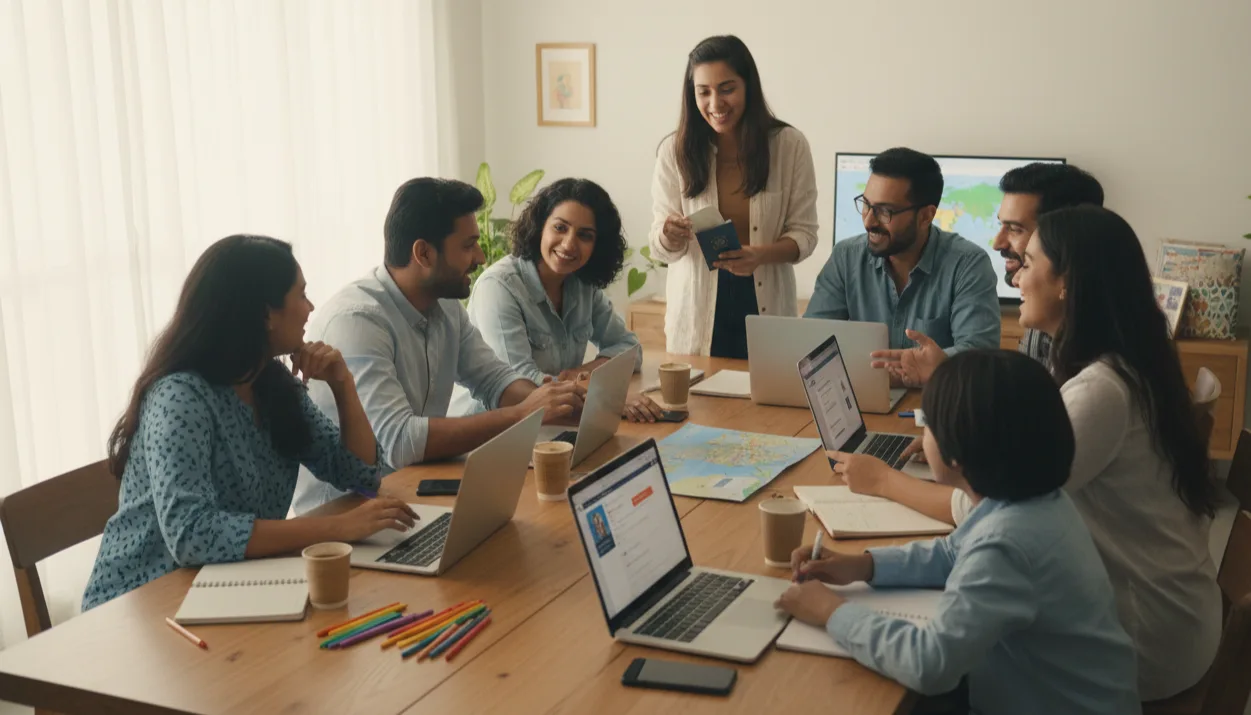
If there’s one thing that defines how Indians approach visa paperwork, it’s caution. We double-check everything, print multiple copies, and keep backups in plastic folders. It comes from years of hearing stories about rejected visas and “wrong documents.” That same caution is exactly why dummy tickets spark so much debate in India.
People don’t reject the idea because it’s wrong—they reject it because it feels risky. Somewhere between a culture that fears making mistakes and an online world full of misinformation, the humble dummy ticket has become one of the most misunderstood parts of travel planning. Make your application stress-free—choose dummy ticket booking for fast, embassy-approved travel documents. For industry standards, see guidelines from the International Air Transport Association (IATA).
Cultural And Bureaucratic Influences
Let’s start with how Indian travel habits evolved. For decades, most Indians depended on travel agents to handle everything—from filling out forms to booking flights. Applicants were told, “Never take chances with the embassy.” That mindset created a culture of over-compliance, where people would rather spend extra than risk rejection.
So, when the concept of a “dummy ticket” came along, it clashed with that thinking. The word “dummy” itself didn’t help. In India, “dummy” often means “fake.” To someone applying for a visa for the first time, that sounds like forgery—and no one wants to get accused of that at an embassy counter.
Older applicants and families, in particular, still hold onto this legacy view. They assume that if the ticket isn’t fully paid, it must be unacceptable. They’re also used to seeing printed flight confirmations, not digital PNRs. So when a travel consultant sends them a reservation email with a link to verify online, they often ask, “But where’s the ticket?”
Then there’s the bureaucratic influence. Indian visa applicants are trained to fear “technical errors.” If you’ve ever stood in a VFS or BLS line, you know how nervous people get before handing over their documents. The atmosphere itself promotes overcaution. Applicants whisper, “Did you print your return flight?” or “Did they check your insurance?” It’s easy to see how dummy tickets, even when legitimate, make some people uneasy.
Neighborhood agents add to the confusion. Many small travel shops still operate the way they did fifteen years ago—printing generic itineraries on templates and calling them dummy tickets. Some don’t generate real reservations at all; they just fill in names and dates to make the file look complete. Travelers assume that’s normal, but those PDFs have no PNRs, which means they’re not verifiable. This old-school method keeps the misunderstanding alive: dummy tickets are seen as “made-up documents” rather than temporary, checkable reservations.
Social Media Misinformation
If you think the offline confusion is bad, go online—it’s worse. Platforms like YouTube, Telegram, and Quora are flooded with advice, much of it contradictory. One video says “dummy tickets are illegal,” while the next one says “use them confidently.” Many Indians, especially students and first-time travelers, rely on these videos for guidance.
That’s how myths spread. You’ll often hear lines like:
-
“Embassies check all PNRs instantly.”
-
“Dummy tickets are banned in Europe.”
-
“Agents can guarantee approval with a real ticket.”
None of these are true, but they sound believable enough to scare someone. What really happens is simple—embassies and visa centers check for logical travel plans, not active tickets. They know applicants can’t afford to risk thousands on airfare before approval.
Telegram groups are especially messy. Some members post genuine recommendations; others promote fake sellers. You’ll see posts like, “Got my visa approved using a dummy ticket! DM for cheap bookings!” The link leads to a WhatsApp number offering ₹300 PDFs that don’t exist in any airline system. A few people buy, get scammed, and then go online to warn others—creating a loop of confusion and fear.
Reddit and Quora have helped somewhat. Experienced travelers there try to explain that dummy tickets are legitimate if they’re verifiable. But those voices often get drowned by sensational claims or half-truths. The problem isn’t that information doesn’t exist—it’s that trustworthy information gets lost in the noise.
The Visa Officer’s Reality
Here’s the truth most Indian applicants never hear: embassies don’t require paid tickets. They only ask for proof of onward or return travel to assess whether your trip is realistic.
When embassy websites say “submit flight reservations,” that’s exactly what they mean—reservations, not purchased tickets. But many Indians misread that line and assume they must buy confirmed flights. That’s how the fear begins.
A Schengen visa officer once explained it plainly during an online Q&A: “We don’t need you to buy your ticket before we issue your visa. We only need to see your intended travel plan.” Unfortunately, very few Indian applicants ever read such clarifications. They rely on second-hand advice, which is often wrong.
The gap between official embassy guidance and public perception is wide. Embassies speak in bureaucratic language; online forums translate that into anxious exaggeration. So when someone says, “My friend’s visa got rejected because of a dummy ticket,” it spreads quickly, even if the reason was completely different.
The result? Thousands of Indians spending unnecessary money on fully refundable or cancelable tickets just to feel safe. They think it’s mandatory, when in reality, a verified dummy ticket would have been perfectly fine.
The Broader Indian Psychology
Underneath all this lies something deeper—how we think about proof and trust. Indians love paper documentation. Even in 2025, we still print boarding passes, e-tickets, and insurance certificates “just in case.” It’s part of our travel DNA. We like to hold evidence in our hands.
That’s why digital verification still feels new. Many travelers don’t fully trust online systems or reservation lookups. They’ve heard too many stories about scams, phishing, and fake emails. So when someone tells them, “You can just verify the PNR online,” their first instinct is doubt. They’d rather see a stamp or a printed receipt.
This fear of online fraud makes people skeptical of legitimate digital dummy tickets. It’s ironic—technology has made travel easier, but it hasn’t erased the instinct to mistrust.
At the same time, trust remains rare in India’s online travel ecosystem. Too many fake sellers, too many half-truths. That’s why even genuine services have to work twice as hard to prove they’re real. Travelers debate dummy tickets not because they question their legality, but because they question everything digital.
In the end, this debate says less about dummy tickets and more about India’s evolving travel culture. We’re in transition—from paper to online, from agents to DIY, from fear to confidence. The dummy ticket conversation just happens to sit right at the center of that change.
As awareness grows, so will acceptance. But for now, the debate continues—not out of ignorance, but out of habit. Indians still like to be sure before they take a leap. And when it comes to visas, that instinct for over-caution is both our greatest protection and our biggest obstacle.
Inside India’s Dummy Ticket Industry — The Good, The Bad, And The Fraudulent
If you’ve spent any time searching for dummy tickets online, you’ve probably seen everything—from professional-looking travel websites to Telegram sellers who promise “real tickets in 5 minutes.” It’s a chaotic marketplace that tells a lot about how fast India’s travel industry is changing.
In 2025, the dummy ticket business in India sits at a fascinating crossroads. On one side are legitimate travel agencies that quietly handle thousands of genuine reservations every month. On the other hand, there’s a messy underworld of fake PDFs, ghost PNRs, and sellers who vanish as soon as they get your UPI payment. Between these two extremes, Indian travelers are learning to tell the difference—and demanding accountability.
Let’s break it down: the good, the bad, and the downright fraudulent.
The Legitimate Side
The real dummy ticket industry in India is built on experience, systems, and credibility. Established travel agencies and online services issue verifiable flight reservations using official airline or GDS (Global Distribution System) platforms like Amadeus, Sabre, or Galileo.
These are not Photoshop creations. They’re real bookings created within airline networks, complete with a PNR—a six-character alphanumeric code you can verify directly on the airline’s “Manage Booking” page. That’s what makes them genuine.
Most legitimate Indian agencies offering these services started as regular travel agents. They book tickets for corporate clients, group tours, and students, but realized there was a huge demand for short-term flight reservations among visa applicants. Instead of ignoring it, they adapted.
Today, agencies in Mumbai, Delhi, Chennai, and Bengaluru quietly handle hundreds of dummy ticket requests daily. They follow embassy norms and even coordinate with VFS or BLS centers to ensure their reservations meet documentation requirements. These agencies don’t advertise aggressively; they rely on repeat clients and word-of-mouth.
A Delhi-based travel consultant explained it well: “We don’t call it a dummy ticket. We call it a verifiable flight reservation. Every embassy knows it’s a common practice.”
For Indian visa applicants, these agencies are a blessing. They deliver fast, clean documents that reduce stress before appointments. Students especially appreciate them—they can secure their visas before committing to expensive airfares. Professionals value how efficiently the service fits into tight schedules.
The process is simple: share your travel details, wait a few hours, verify your PNR online, print your confirmation, and you’re done. If your visa takes longer, you can even request a refresh—a new PNR with updated travel dates.
Most good providers also comply with tax regulations, offering GST invoices for transparency. They accept payments via UPI, debit card, or bank transfer and provide customer support over email or WhatsApp. These are small but critical signals that separate real providers from fly-by-night operators.
The Unregulated Boom
The other side of the industry looks very different. Over the last two years, Telegram channels, WhatsApp resellers, and Instagram pages have exploded with offers like:
“Dummy Ticket ₹299 – Schengen Visa Guaranteed!” “Get Real Flight Confirmation in 10 Minutes!”
It sounds tempting—but most of these sellers are not agents. They’re resellers or individuals running small side hustles during India’s post-COVID travel surge. Between 2023 and 2024, as global borders reopened, visa applications skyrocketed. Students returning to universities abroad, families resuming holidays, and remote workers chasing nomad visas all needed documentation fast.
The demand for quick dummy tickets grew faster than legitimate agencies could handle. That’s when opportunists stepped in. Some of them copy real tickets from Google Images, edit names and dates, and sell them as “custom dummy tickets.” Others use cheap booking portals that generate temporary references that vanish within hours.
Telegram and WhatsApp made it worse. These platforms allow anonymous sellers to pop up, take payments via UPI, and disappear before anyone complains. You can’t trace them. You can’t get refunds. And you can’t always tell the difference between a real and fake document until it’s too late.
This underground market thrives on one thing—speed. People panic before their visa appointments and want something “right now.” Scammers know that urgency kills caution.
The Scam Ecosystem
Here’s what the dark side of the dummy ticket business looks like in real life.
A 22-year-old student from Indore shared how she lost credibility with the French embassy after submitting a fake ticket. She bought it from a Telegram contact who claimed to be “VFS-approved.” The PDF looked clean, complete with logos and flight details. But when the visa officer tried to verify the PNR, it didn’t exist. Her application was delayed, and she had to reapply with proper documentation.
Scams like this follow a predictable pattern:
-
Step 1: The seller posts ads claiming to issue “real tickets” at throwaway prices.
-
Step 2: The buyer pays via UPI or Paytm.
-
Step 3: A PDF arrives in minutes, looking convincing at first glance.
-
Step 4: The PNR doesn’t work, and the seller vanishes.
Some scammers even use AI tools to generate “custom” itineraries that look unique but are completely fake. The layout mimics real airline confirmations, but the data doesn’t match any database.
The bigger problem? There’s almost no consumer protection. For small-ticket transactions under ₹500, UPI platforms don’t prioritize disputes. Reporting such fraud rarely leads to refunds. Most victims just move on, angry and embarrassed.
For students or first-time applicants, the cost isn’t just financial—it’s emotional. Submitting a fake ticket, even unknowingly, can cause sleepless nights before a visa appointment. And while embassies don’t always penalize these cases harshly, it creates unnecessary anxiety and distrust.
Comparing Authentic vs. Fake Providers
Now that Indian travelers are getting savvier, they’re learning how to tell a real provider from a fake one. The differences are clearer than ever once you know what to look for.
Authentic providers:
-
Issue PNRs that can be verified directly on the airline website.
-
Send confirmation emails that come from actual airline domains.
-
Provide PDF itineraries that match the verified details exactly.
-
Offer clear refund or reissue policies.
-
Are registered businesses with GST numbers and contact details.
Fake or risky providers:
-
Share only a PDF with no airline confirmation.
-
Avoid giving a PNR or delay sharing it until payment clears.
-
Send screenshots instead of full documents.
-
Disappear once you raise a concern or request a verification check.
Pricing also tells a story. Genuine services usually charge between ₹1000 and ₹1,500 for single reservations because they pay real system fees to airlines or booking tools. Scammers who charge ₹199 or ₹299 are either fabricating documents or using temporary booking tricks that expire in hours.
After-sales support is another big clue. Real providers answer questions like “Can I verify this PNR?” or “Can I refresh it next week?” Fake ones simply ignore you.
The distinction between “dummy” and “fake” is becoming clearer in India’s 2025 travel scene. A dummy ticket is temporary but verifiable. A fake ticket is fabricated and unverifiable. Indian travelers, especially students and frequent flyers, now use that language confidently.
The Shift Toward Transparency
Something new is happening in 2025—the industry is cleaning itself up. Travelers are asking better questions, embassies are clarifying guidelines, and real providers are stepping forward to prove their legitimacy.
More dummy ticket services are now GST-registered, publicly listing their support numbers, and showing verification steps upfront. Some even allow users to check PNRs before paying. That level of openness didn’t exist a few years ago.
Visa consultants, too, are updating their practices. Instead of hiding behind vague promises, they explain to clients that flight reservations are standard procedure—not a trick. This transparency helps build trust.
The rise of awareness campaigns on YouTube and Reddit also plays a role. Influencers are teaching applicants how to verify their bookings and avoid scams. These educational videos are shifting the tone of the discussion from fear to empowerment.
We’re also seeing collaborations between agencies and fintech tools that track digital payments, making fraud harder to hide. It’s slow progress, but it’s progress nonetheless.
By mid-2025, Indian travelers have become far more informed. They check airline websites, demand invoices, and expect responsive service. And that pressure from customers is forcing shady operators to disappear.
In short, India’s dummy ticket industry is maturing. It started as a gray area filled with confusion and shortcuts. But now, it’s moving toward legitimacy through awareness, transparency, and technology.
The conversation has changed from “Is this legal?” to “Is this verifiable?” That’s a big step forward for Indian travelers—because in 2025, trust isn’t assumed anymore. It’s verified.
A Trusted Option For Genuine, Verifiable Dummy Tickets In India
In 2025, Indian travelers are far more informed about what truly matters in the visa application process. After years of trial and error, scams, and confusion, people now look for services that are transparent, verifiable, and completely legal. Avoid costly mistakes before you fly—book a dummy ticket instantly and get peace of mind for your visa submission.
They no longer gamble with random PDFs or unverifiable bookings. Instead, they prefer reliable dummy ticket providers who can issue a dummy flight ticket that aligns perfectly with embassy and consulate expectations. Travelers today want clear proof—something they can verify through a valid PNR or booking reference number before submission.
This awareness has paved the way for professional platforms like dummyflights.com, which serve customers ethically and efficiently. It’s the go-to option for anyone who values simplicity, verified documentation, and a stress-free experience.
👉 Order your dummy ticket today for seamless visa support.
Why Travelers Are Seeking Reliable Providers
Visa applicants in India are cautious. They’ve learned from experience that not every dummy ticket booking service can be trusted. After countless stories of fake PDFs and expired PNRs, most travelers now prefer online-generated dummy tickets that are verifiable through the airline’s official system.
They look for a few clear signs before purchasing:
-
An active and valid PNR that can be checked online.
-
An airline confirmation email showing a real ticket number and departure time.
-
Transparent pricing with very reasonable prices and no hidden fees.
-
A responsive support team ready to help if flight dates or visa schedules change.
-
Quick turnaround for those needing discounted price urgent delivery before embassy deadlines.
People want reassurance that their travel intentions are clear to visa officers. They know that a dummy flight ticket, legal for embassy applications, doesn’t break any rules. It simply provides flight reservations that meet visa requirements and prove you plan to travel responsibly.
Our Service — Designed For Indian Applicants
dummyflights.com was built for real Indian travelers — students, families, professionals, and digital nomads who value trust and accuracy. We provide dummy tickets and hotel reservations that comply with embassy formats for Schengen countries, the UK visa process, and Canada visa applications.
Each document we issue is a valid itinerary that follows global consular norms. Clients receive:
-
A real PNR code generated through authorized systems.
-
An email confirmation directly from major airlines like Air France, Lufthansa, or Emirates.
-
A printable flight itinerary showing their mentioned flight itinerary and return flight ticket details.
-
Access to dummy hotel booking options if their embassy also requires accommodation proof.
Unlike unverified sellers, dummyflights.com operates as an established online travel agency. We understand that a proper flight booking must include a booking reference and a genuine e-ticket number. Every dummy air ticket or dummy hotel booking issued through our system is created for official visa submission, not for travel.
These reservations are widely recognized because they include all the elements of an actual flight reservation — from the route and round-trip ticket details to the correct departure time. You can even use them for onward flight ticket verification when required by immigration officers during exit visa procedures or border checks.
Booking a Dummy Flight Ticket
Booking through dummyflights.com is designed to be effortless. You don’t need a travel agent or a middleman. Everything happens online, quickly and securely.
-
Search – Enter your details: full name, flight dates, route, and visa type.
-
Select – Choose between flight reservations, hotel reservations, or both.
-
Confirm & Pay – Review your flight booking and complete the payment through multiple payment methods.
-
Download – Receive your PDF reservation instantly — ready to print for your visa application process.
-
Verify – Use the airline’s official Manage Booking tool to confirm your PNR and ticket number.
-
Refresh If Needed – If your visa is delayed, request updated documents at no extra cost.
It takes just payment and a few clicks to receive what you need. Most applicants get their confirmed booking within minutes. Our team ensures the valid itinerary matches your travel intentions and complies with embassy expectations.
If you’re concerned about routing, you can filter out connections that might require a transit visa — for example, avoiding stopovers in the UK if you don’t have one. This flexibility ensures you submit a visa file that’s realistic and fully compliant.
Benefits For Indian Travelers
dummyflights.com exists to make the visa journey smooth and dependable. Here’s why so many travelers prefer our good services:
1. Genuine, Verifiable Documents Each reservation includes a valid PNR that works on airline websites. Whether it’s a one way ticket or a return ticket, the system confirms your booking reference number instantly. You can check it yourself before submission.
2. Recognized For All Major Visas Our dummy flight tickets and dummy hotel bookings are accepted for Schengen countries, UK visa files, Canada visa requirements, Japan, and other global destinations. The format meets embassy standards, ensuring your application stays risk-free.
3. Transparent And Affordable We operate with very reasonable prices — just $15 per person for either a flight or hotel reservation. That includes unlimited date changes and no cancellation fees. Multi-city itineraries are also available at a discounted price urgent delivery rate.
4. Instant Delivery Time-sensitive? You’ll receive your documents immediately after checkout. That makes us a favorite for last-minute applicants or those handling re-submissions.
5. Unlimited Revisions Change of flight dates? Delayed appointment? Simply message our multi lingual staff, and we’ll reissue your reservation right away.
6. No Hidden Charges We never penalize you for edits or cancellations. This ensures you can avoid visa cancellation issues caused by outdated travel dates or mismatched documents.
7. Convenient Payment Options Pay easily through UPI, debit card, or bank transfer — with GST invoices for full transparency. You can even pay in different currency options if you’re abroad.
8. Reliable Support Anytime Our support team works around the clock to handle queries in both English and Hindi. They help verify every confirmed ticket or provide guidance on aligning your dummy hotel booking benefits with your flight itinerary.
9. Trusted By Diverse Travelers
-
Students: Avoid locking in full-fare flights before receiving your visa.
-
Families: Create consistent itineraries for everyone in the group.
-
Professionals: Save time with pre-verified flight tickets accepted worldwide.
-
Nomads and Tourists: Present a confirmed flight ticket or valid onward travel proof at airports when required.
These are a few more reasons why dummyflights.com continues serving customers across India with reliability and confidence.
Why It Fits This 2025 Review
In this Dummy Ticket India Review, we’re not just talking about convenience. We’re looking at how the travel landscape in India has matured. dummyflights.com reflects this evolution — offering reliable documentation that’s compliant, fast, and stress free.
It symbolizes the shift from unverified sellers to trustworthy platforms that provide dummy tickets and valid hotel reservations backed by clear verification steps. Travelers don’t just want speed; they want proof that their confirmed booking can be checked online anytime.
The service also supports applicants aiming to avoid visa cancellation by ensuring their visa files remain current with accurate flight dates and confirmed itineraries. Every document from dummyflights.com can be tracked, verified, and aligned with your visa requirements — something shady providers simply can’t offer.
dummyflights.com has become a trusted name for Indian travelers who value control over uncertainty. With transparent operations, professional staff, and legitimate partnerships, it represents exactly what this 2025 review is about — responsible, modern travel preparation.
For most applicants, choosing dummyflights.com isn’t just about saving money. It’s about confidence. It’s about knowing that the dummy flight ticket you’re submitting is valid, verifiable, and accepted everywhere.
Whether you’re applying for a Schengen visa, a UK work permit, or a Canada visa, our process gives you everything embassies want to see: a valid itinerary, consistent travel details, and a genuine commitment to travel.
In short, dummyflights.com stands as the reliable bridge between your visa paperwork and your actual flight reservation — giving Indian travelers the clarity, credibility, and peace of mind they’ve always needed.
Lessons, Patterns, And The Road Ahead — What 2025 Reveals
By 2025, Indian travelers will have rewritten the story of dummy tickets. What used to be a confusing, misunderstood idea has become a smart, responsible part of travel preparation. Real travelers have learned that legitimacy lies in verification, not fear.
What Indian Travelers Have Learned
The biggest shift is understanding that dummy tickets are legitimate if they’re verifiable. Travelers no longer equate “dummy” with “fake.” They know that embassies request proof of travel intent—not paid tickets—and a verified reservation fulfills that purpose.
People have also realized that scams thrive on ignorance, not legality. The problem was never the concept of dummy tickets; it was misinformation. Thousands of Indians have seen firsthand how easy it is to avoid trouble by checking their PNR on an airline’s website. Today, most applicants verify their details themselves instead of relying blindly on agents.
Students, families, and professionals alike now follow one golden rule: “If it can’t be verified, don’t submit it.” This simple habit has reduced anxiety and improved the overall quality of visa applications across the country.
The Broader Patterns
Zooming out, India’s travel ecosystem shows clear patterns. The gap between urban and rural awareness is narrowing. While big cities like Delhi and Mumbai led the charge, applicants from smaller towns are catching up fast. Online tutorials, visa discussion groups, and influencer content have helped spread reliable information beyond metros.
Another trend is the surge in first-time passport holders. With more Indians aspiring to travel for work, study, and tourism, the number of applicants using online dummy ticket platforms has skyrocketed. What was once a niche service is now a mainstream tool.
Visa consultants are adapting too. Instead of using shady local sellers, many now partner with verified dummy ticket providers who can issue verifiable PNRs and airline confirmations. This collaboration reduces rejections and builds client trust. Consultants have realized that being transparent helps them retain long-term customers.
Embassy staff have also noticed this improvement. Indian applicants now arrive with more accurate itineraries, cleaner documentation, and fewer inconsistencies—a testament to growing awareness.
Institutional And Airline Perspectives
Even institutions are evolving. Airlines are tightening verification for onward travel proof, especially for destinations like Thailand, Singapore, and Dubai. They’re ensuring that passengers boarding from India have legitimate bookings—temporary or otherwise. This protects both airlines and travelers from confusion at immigration desks.
Embassies are also clarifying their instructions. Many now state explicitly that “flight reservations are accepted” or that “paid tickets are not mandatory before visa issuance.” These clear statements have eased fears and prevented unnecessary spending.
Travel communities, especially online forums and Reddit groups, now act as informal watchdogs. Members quickly flag fake dummy ticket sellers or unverified PNR generators. Peer accountability has become a new line of defense for Indian travelers.
The Cultural Shift In India
This transformation runs deeper than just documentation. It reflects a cultural shift in how Indians think about travel and technology. A few years ago, most applicants depended entirely on agents. Now, travelers are self-reliant, tech-savvy, and verification-oriented. They know how to cross-check details, manage bookings online, and interpret embassy instructions.
Where mistrust once dominated, there’s now cautious confidence. People still double-check every step, but they do so from a place of awareness, not fear. Dummy tickets, once whispered about in visa lines, are now openly discussed and widely accepted as part of responsible travel prep.
For many, 2025 is the “normalization year” — when dummy tickets stopped being controversial and became a symbol of smart planning. Indians no longer feel guilty using them; they feel empowered by understanding them.
Dummy Flight Reservations: The Future Outlook
Looking ahead, the trajectory is clear. By 2026 or 2027, the term “dummy ticket” will likely shed its old connotations completely and enter everyday vocabulary. It will be seen as a standard travel support document, not an exception.
There’s also talk in the industry about regulation or accreditation for online providers. As the market grows, the need for verified, transparent platforms will only increase. Such oversight would formalize the service and make it easier for travelers to identify legitimate sources.
Education will continue to play the biggest role. Travel influencers, universities, and consultants will keep teaching applicants how to verify their bookings and avoid scams. This ongoing awareness campaign will reduce fraudulent activity and enhance India’s reputation for organized, responsible travelers.
In the end, 2025 is more than just a turning point for dummy tickets—it’s proof that Indian travelers have grown up. They’re no longer passengers following instructions; they’re informed, confident decision-makers shaping a smarter, safer, and more transparent travel culture for the future. Get ready for your next trip with ease—complete your dummy ticket booking in minutes and travel confidently.
What Travelers Are Saying
More Resources
Related Guides
About the Author
Visa Expert Team - With over 10 years of combined experience in travel documentation and visa assistance, our team at dummyflights.com specializes in creating verifiable travel itineraries. We’ve helped thousands of travelers navigate visa processes across 50+ countries, ensuring compliance with embassy standards.
Trusted Sources
Important Disclaimer
While our dummy tickets with live PNRs are designed to meet common embassy requirements, acceptance is not guaranteed and varies by consulate or country. Always verify specific visa documentation rules with the relevant embassy or official government website before submission. dummyflights.com is not liable for visa rejections or any legal issues arising from improper use of our services.

